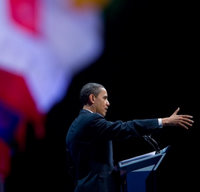President Barack Obama's historic address to the Muslim world in Cairo tomorrow offers a prime opportunity to outline a new U.S. vision for democracy and human rights in the region. To accomplish this goal, Obama must firmly reject the notion that safeguarding America's strategic interests in the Middle East somehow runs counter to the goal of advancing political reform. Instead he must craft a balanced message that recognizes that reform is synonymous with U.S. interests in the region.
Unfortunately, if early signs are any indication, the president seems to be striking the wrong balance. The delayed appointments of key democracy promotion and human rights officials -- including the administrator for the Agency of International Development and the assistant secretary of state for Democracy, Human Rights and Labor -- suggest that the issue is simply not a high priority.
Policy statements and decisions by top officials are sending a more disturbing signal. In February, Secretary of State Hillary Clinton said that China's adherence to global human rights standards, or lack thereof, can't interfere with larger economic and security concerns. The administration has even acceded to Egyptian demands that economic assistance not be used to support civil society groups and has slashed funds for democracy promotion by 60 percent. The Obama administration seems to be falling into the same trap that has plagued U.S. foreign policy for decades: placing short-term strategic concerns above the long-term imperative to press for reform.

